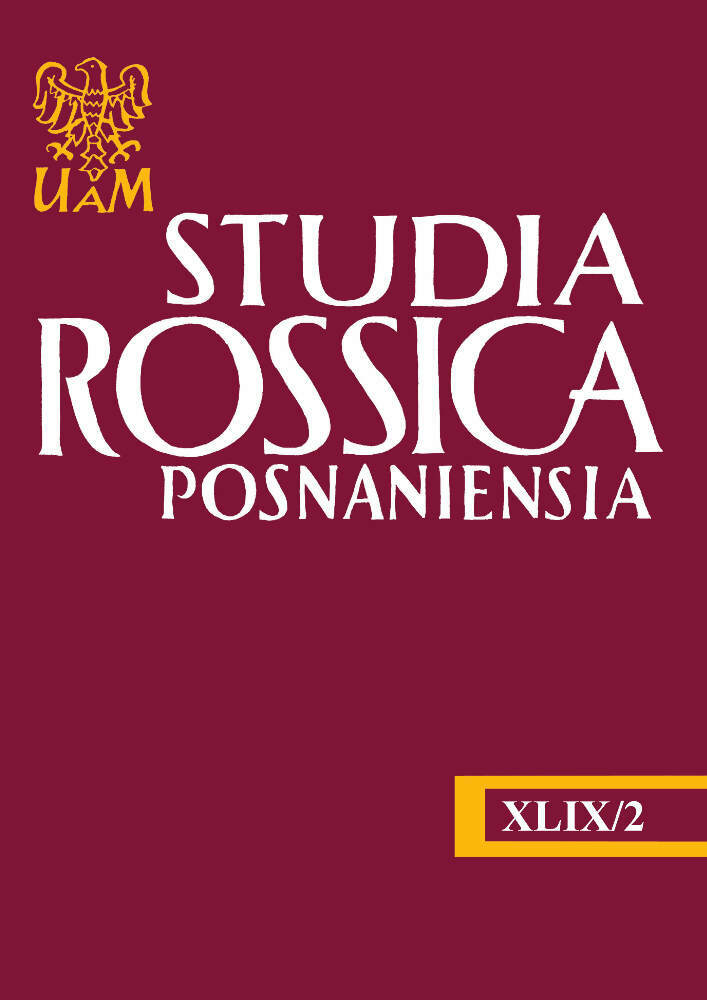Abstrakt
The article is devoted to the discussion of structural elements and motifs in the short story of the Russian modernist Aleksey Skaldin entitled Trace. In his work, the writer reinterprets certain aspects from Fyodor Dostoevsky’s novel Crime and punishment. It can be assumed that the two texts chosen for comparative analysis are marked by similar ideas (crime, punishment, Übermensch). The goal of the analysis is to underscore the shared and relevant contents of both literary works. The main character of Skaldin’s Trace, Ivan Vyakhirev, is guided by the theory of the division of society into outstanding and ordinary individuals, similarly to Rodion Raskolnikov. Vyakhirev can be seen as a variant of Raskolnikov. Even though he does not know the book Crime and punishment, he “develops” Raskolnikov’s theory. Vyakhirev wants to prove his own uniqueness, the final test being the murder of his old friend. Similar experiences and reasoning of the characters lead them, however, in completely opposite directions. Raskolnikov reevaluates his life and the views he held as he admits that he is not an outstanding individual above the law. Skaldin’s Trace illustrates the reverse path of human personality development. Initiatory signs appear on Vyakhirev’s path, but he is unable to see and use them, and he does not develop self-awareness. He rejects their power, embarking on a dark path. The interpretation of Skaldin’s text through the prism of the ideas contained in Crime and punishment leads to an in-depth reading of the meanings and symbols hidden in Trace (including guilt, freedom, and the female figure).
Bibliografia
Arnold, Paul. Istoriâ rozenkrejcerov i istoki frankmasonstva. Per. Vladilen Kasparov. Moskva, Izdatelʹstvo Ènigma, 2011.
Bahtin, Mihail. Problema poètiki Dostoevskogo. Web. 03.11.2023. https://www.edu.yar.ru/russian/tvorch/filolog/dost/zah/dost.html.
Berdâev, Nikolaj. Filosofiâ svobody. Web. 20.12.2023. https://www.litres.ru/book/nikolay-berdyaev/filosofiya-svobody-177076/chitat-onlayn/.
Berdâev, Nikolaj. Mirosozercanie Dostoevskogo. Web. 20.12.2023. http://az.lib.ru/b/berdjaew_n_a/text_1921_dostoevsky.shtml.
Blok, Aleksandr. Pisʹma 1898–1921. Т. 8. Moskva, Goslitizdat, 1962.
Carʹkova, Tatʹâna. „«Čeloveka ubitʹ prosto...» (saratovskij period žizni pisatelâ A.D. Skaldina)”. Russkaâ literatura, 1, 1994a, s. 180–187.
Carʹkova, Tatʹâna. „…nitʹ blestâŝaâ tonka”. Aleksej Skaldin. Proza. Statʹi. Materialy k biografii. Red. Tatʹâna Carʹkova. Sankt-Peterburg, Izdatelʹstvo Ivana Limbaha, 2004, s. 5–26.
Carʹkova, Tatʹâna. „«Skaldinovŝina» (Saratovskij period žizni A.D. Skaldina)”. Lica: Biografičeskij alʹmanah. Red. Aleksandr Lavrov. T. 5. Moskva, Sankt-Peterburg, Feniks, Atheneam, 1994b, s. 460–486.
Carʹkova, Tatʹâna. Terpenie i vernostʹ. Očerk ob Aleksee Skaldine. Web. 02.11.2023. http://az.lib.ru/s/skaldin_a_d/text_0050.shtml.
Cegielski, Tadeusz. „Ordo ex chao”. Wolnomularstwo i światopoglądowe kryzysy XVII i XVIII wieku. Warszawa, Wydawnictwo Fundacji „Historia pro Futuro”, 1994.
Dee, John. Monada hieroglificzna. Przeł. Łukasz Berezowski. Warszawa, Wydawnictwo Okultura, 2012.
Dostoevskij, Fedor. Prestuplenie i nakazanie. Moskva, Izdatelʹstvo Astrelʹ, 2011.
Evdokimov, Paul. Gogol i Dostojewski, czyli zstąpienie do otchłani. Bydgoszcz–Warszawa, Wydawnictwo Homini, 2002.
Faivre, Antoine. Zapadnyj èzoterizm. Kratkaâ istoriâ. Per. Petr Okorokov. Moskva, Kastaliâ, 2018.
Gercij, Vitalij. „Vina i stradanie v strukture Prestupleniâ i nakazaniâ F.M. Dostoevskogo”. Istoričeskaâ i socialʹno-obrazovatelʹnaâ myslʹ, 7 (6), 2015, s. 255–259.
Grossman, Leonid. Dostojewski. Przeł. Seweryn Pollak. Warszawa, Wydawnictwo Czytelnik, 1968.
Hanegraaff, Wouter Jacobus. Zapadnyj èzoterizm. Putevoditelʹ dlâ zaputavšihsâ. Per. E. Zorâ. Red. Aleksandr Ryčkov. Moskva, Centr knigi Rudomino, 2016.
Hanegraaff, Wouter Jacobus et al., red. Dictionary of gnosis and Western esotericism. Boston, Brill Academic Publishers, 2006.
Ivanov, Georgij. Peterburgskie zimy. Web. 02.11.2023. http://lib.ru/RUSSLIT/IWANOWG/russkie_zimy.txt.
Krejd, Vadim. „O Skaldine i ego romane”. Aleksej Skaldin. Stranstviâ i priklûčeniâ Nikodima Staršego. Izdatelʹstvo Antikvariat, Orange, Antiquary, 1990.
Krejd, Vadim. Skaldin, Aleksej Dmitrievič. Web. 02.11.2023. https://www.krugosvet.ru/enc/kultura_i_obrazovanie/literatura/SKALDIN_ALEKSE_DMITRIEVICH.html.
Kubiak, Zygmunt. Mitologia Greków i Rzymian. Kraków, Społeczny Instytut Wydawniczy Znak, 2013.
Lévi, Èlifas. Istoriâ magii. Web. 02.11.2023. https://thelib.ru/books/levi_elifas/istoriya_magii-read-20.html.
Losskij, Nikolaj. Istoriâ russkoj filosofii. Moskva, Sovetskij pisatelʹ, 1991.
Lovejoy, Arthur. Velikaâ cepʹ bytiâ. Web. 20.12.2023. https://psylib.org.ua/books/lovejoy/index.htm.
Okroj, Kinga. „Mojte ognem i žgite vodoj”. Èzoteričeckie motivy v proze Alekseâ Skaldina. Gdańsk, Wydawnictwo Uniwersytetu Gdańskiego, 2023.
Petrovskij, Nikandr. Slovarʹ russkih imen. Web. 02.11.2023. http://gramota.ru/slovari/dic/?pe=x&word=родион.
Prokopiuk, Jerzy. Historia Różo-Krzyża. Kraków, Stowarzyszenie A.M.O.R.C., 2013.
Protas, Bartosz. „Ruch różokrzyżowców a twórczość angielskich myślicieli i poetów”. Ars Regia, 9 (15–16), 2006, s. 11–44.
Przebinda, Grzegorz. Włodzimierz Sołowjow wobec historii. Kraków, Wydawnictwo Arka, 2002.
Przybylski, Ryszard. „Fiodor Dostojewski”. Historia literatury rosyjskiej. Red. Marian Jakóbiec. T. 1. Warszawa, Wydawnictwo Naukowe PWN, 1976, s. 252–307.
Rijckenborgh, Jan van. Alchemiczne gody Chrystiana Różokrzyża. Ezoteryczna analiza chemicznych godów Chrystiana Różokrzyża Anno 1459. Wieluń, Instytut Wydawniczy Rozekruis Pers, 2005–2007.
Sédir, Paul. Różokrzyżowcy. Historia i nauka. Oprac. i przeł. Jerzy Prokopiuk. Warszawa, Wydawnictwo Pegaz, 1994.
Skaldin, Aleksej. Stihi. Proza. Statʹi. Materialy k biografii. Red. Tatʹâna Carʹkova. Sankt-Peterburg, Izdatelʹstvo Ivana Limbaha, 2004.
Sołowjow, Sergiusz. Życie i ewolucja twórcza Włodzimierza Sołowjowa. Przeł. Eugenia Siemaszkiewicz, Seweryn Pollak. Poznań, Wydawnictwo „W drodze”, 1986.
Špidlík, Tomáš. Myśl rosyjska. Inna wizja człowieka. Przeł. Janina Dembska. Warszawa, Wydawnictwo Księży Marianów, 2000.
Trockij, Sergej. „Vospominaniâ”. Novoe literaturnoe obozrenie, 10, 1994, s. 41–87.
Yeates, Frances. Džordano Bruno i
Licencja
Prawa autorskie (c) 2024 Kinga Okroj

Utwór dostępny jest na licencji Creative Commons Uznanie autorstwa – Użycie niekomercyjne – Na tych samych warunkach 4.0 Międzynarodowe.

